8 start with C start with C

According to Eyring, the men and women who most successfully wrote about and engaged in benevolent work strategically connected their work with the affluence generated by maritime commerce. The water trades supported the growth of the American publishing industry, but they also generated both vast inequities in wealth and physically and economically hazardous conditions that, in the absence of a welfare state, required the intervention of benevolent societies. Laborers in Atlantic port cities barred from lucrative professions by gender, race, physical ability, or social status found a way to make a living wage by conjoining the literary with the charitable—and attaching both to a profit structure. In so doing, they transformed the nature of American benevolence and gave rise to the nonprofit sector, which has since its inception provided discontented laborers with a forum in which to express their critique of for-profit American enterprise, by imitating it.
In Captains of Charity, Eyring looks at writers who overcame their marginalized status by bringing together the strands of maritime industry, publishing, and benevolence. These include Richard Allen and Absalom Jones, two black clergymen who managed a massive relief effort when refugees fleeing revolution in Haiti transported the yellow fever virus to Philadelphia in 1793; Nancy Prince, a free woman of color who sought her livelihood in the Protestant missions of Jamaica in the years immediately following Britain's emancipation of laborers in its Caribbean colonies; Sarah Josepha Hale, who parlayed the social influence she had gained as the founder of a seaman's aid society in Boston into a role as editor of the hugely popular periodical Godey's Lady's Book; and Sarah Pogson Smith, who donated the proceeds of her writing to such prominent charitable causes as the New York Institution for the Instruction of the Deaf and Dumb and then capitalized on the goodwill this charity work generated among her wealthy friends in New York City, Philadelphia, and Charleston.
Hardcover is un-jacketed.
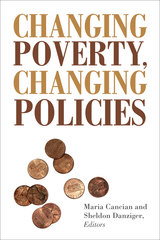

Too often, say its critics, U.S. domestic policy is founded on ideology rather than evidence. Take "Charitable Choice": legislation enacted with the assumption that faith-based organizations can offer the best assistance to the needy at the lowest cost. The Charitable Choice provision of the 1996 Welfare Reform Act—buttressed by President Bush's Faith-Based Initiative of 2000—encouraged religious organizations, including congregations, to bid on government contracts to provide social services. But in neither year was data available to prove or disprove the effectiveness of such an approach.
Charitable Choice at Work fills this gap with a comprehensive look at the evidence for and against faith-based initiatives. Sheila Suess Kennedy and Wolfgang Bielefeld review the movement's historical context along with legal analysis of constitutional concerns including privatization, federalism, and separation of church and state. Using both qualitative and, where possible, statistical data, the authors analyze the performance of job placement programs in three states with a representative range of religious, political, and demographic traits—Massachusetts, Indiana, and North Carolina. Throughout, they focus on measurable outcomes as they compare non-faith-based with faith-based organizations, nonprofits with for-profits, and the logistics of contracting before and after Charitable Choice.
Among their findings: in states where such information is available, the composition of social service contractor pools has changed very little. Reflecting their varied political cultures, states have funded programs differently. Faith-based organizations have not been eager to seek government contracts, perhaps wary of additional legal restraints and reporting burdens.
The authors conclude that faith-based organizations appear no more effective than secular organizations at government-funded social service provision, that there has been no dramatic change in the social welfare landscape since Charitable Choice, and that the constitutional concerns of its detractors may be valid. This empirical study penetrates the fog of the culture wars, moving past controversy over the role of religion in public life to offer pragmatic suggestions for policymakers and organizations who must decide how best to assist the needy.
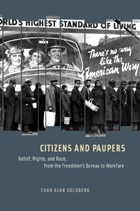
Citizens and Paupers explores this contentious history by analyzing and comparing three major programs: the Freedmen’s Bureau, the Works Progress Administration, and the present-day system of workfare that arose in the 1990s. Each of these overhauls of the welfare state created new groups of clients, new policies for aiding them, and new disputes over citizenship—conflicts that were entangled in racial politics and of urgent concern for social activists.
This combustible mix of racial tension and social reform continues to influence how we think about welfare, and Citizens and Paupers is an invaluable analysis of the roots of the debate.
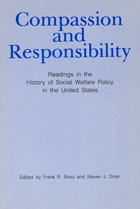

Why is there so much poverty in America in the 1990s? What can be done to reduce it? In this book the leading experts review three decades of research on the nature, causes, and consequences of poverty, and prescribe an antipoverty agenda for the next decade. The authors document trends in poverty and income inequality, review government programs and policies, and analyze the public’s complicated attitudes concerning these policies. They discuss the persistence and inter-generational transmission of poverty, the extent of welfare dependence, and the emergence of an urban underclass.
Confronting Poverty proposes thoughtful reforms in employment and training, child support, health care, education, welfare, immigration, and urban policies, all crafted from the successes, as well as the failures, of policies over the past three decades. Although antipoverty efforts have been frustrated by slow economic growth, rising inequality, and changes in family structure, the authors offer insightful proposals that will help us resolve the American paradox of “poverty amidst plenty.”
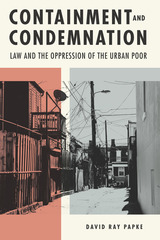
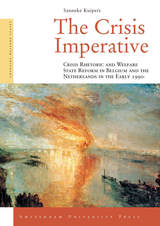
READERS
Browse our collection.
PUBLISHERS
See BiblioVault's publisher services.
STUDENT SERVICES
Files for college accessibility offices.
UChicago Accessibility Resources
home | accessibility | search | about | contact us
BiblioVault ® 2001 - 2024
The University of Chicago Press









